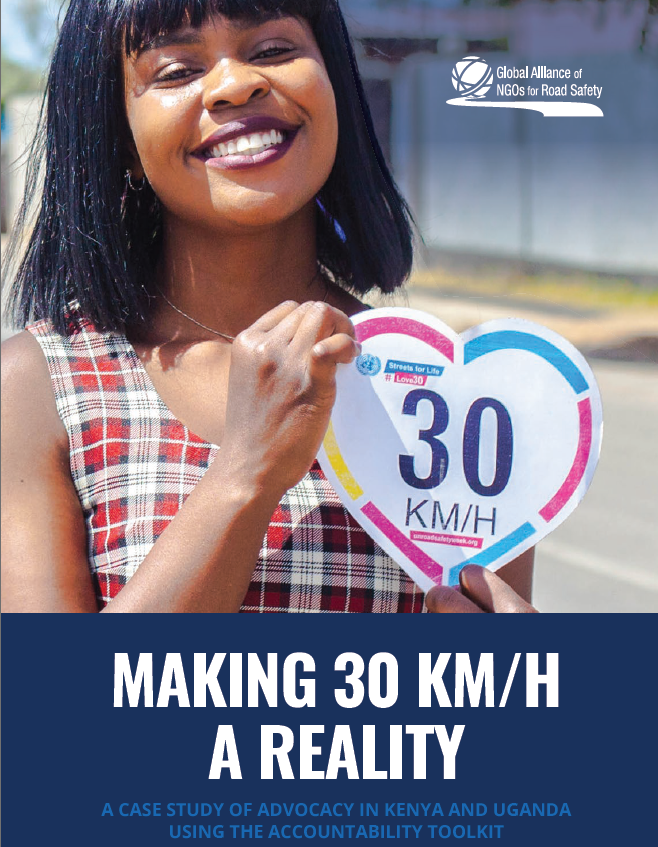
Advocacy, commitments, funding, and implementation of interventions which do not reduce deaths and injuries are wasting time and resources.
Today, the Global Alliance of NGOs for Road Safety, with generous support from TotalEnergies Foundation, publishes a case study titled Making 30 km/h a reality: A case study of advocacy in Kenya and Uganda using the Accountability Toolkit. It demonstrates how NGOs are influencing policy and driving implementation of 30 km/h zones, a proven intervention to reduce deaths and injuries. We closely followed Alliance member NGOs in Kenya and Uganda who have applied the Alliance Accountability Toolkit (Toolkit) to successfully advocate for 30 km/h limits which is crucial for accelerating progress towards meeting the targets of the Global Plan for the Decade of Action for Road Safety 2021–2030.
The case study illustrates how Association for Safe International Road Travel (ASIRT) Kenya and Uganda Road Accident Reduction Network Organisation (URRENO) applied the tools in the Toolkit to advocate for implementation of 30 km/h zones in Kenya and Uganda respectively. These practical examples provide further guidance and tips for NGOs to meaningfully engage their government, ensuring their accountability to implement life saving interventions such as 30 km/h zones, with the support of the Toolkit.
In Kenya, the government has committed to 30 km/h zones as a policy priority and initiated a review of the Traffic Act to make 30 km/h the default speed limit in urban areas. In Uganda, the government has reviewed regulations to lower urban speed limits from 50 km/h to 30 km/h and these regulations have been gazetted.
The case study is accompanied by the launch of a new webpage in the Toolkit: Lessons learned: Real-world application of the Accountability Toolkit for 30 km/h zones. It summarizes the learning from seven NGOs in Argentina, Chile, Kenya, Nepal, Tanzania, Tunisia and Uganda, advocating for 30 km/h zones using the Toolkit under the Alliance Incubator program. This program was co-funded by the FIA Foundation, TotalEnergies Foundation and Michelin. The learning webpage provides further examples of how the Toolkit supported NGO advocacy for 30 km/h zones and offers advocacy tips that other NGOs can adopt to advance implementation of 30 km/h zones in their countries.
“The case study demonstrates how, with the right tools and support, NGOs can hold their governments accountable and drive meaningful policy change. The experiences of ASIRT Kenya, URRENO, and other Alliance members demonstrate what is possible when empowered NGOs use the Accountability Toolkit to turn advocacy into measurable action,” said Lotte Brondum, Executive Director of the Global Alliance. “We thank TotalEnergies Foundation for their support of the Incubator program for our Africa Chapter members, and FIA Foundation for supporting Toolkit implementation for 30 km/h advocacy.”
“TotalEnergies Foundation is proud to support the Alliance Africa Chapter members, the Incubator program, and the publication of this case study,” said Dominique Le Baron, Road Safety Projects Manager, TotalEnergies Foundation. “These initiatives exemplify our shared commitment to empowering local actors with the resources, tools, and data they need to make roads safe for all.”
Aggie Krasnolucka, Programmes Director, the FIA Foundation said, “We are pleased to see the impact of the Toolkit to inform and shape 30 km/h zone policy development and implementation in a range of different countries around the world. This report brings together learnings from Kenya and Uganda, complemented by five other country case studies from across Latin America, Africa, and Asia. We hope these insights will encourage other NGOs to focus and strengthen their own advocacy strategies to achieve similar results in their countries to save lives across streets worldwide.”
The Global Alliance of NGOs for Road Safety (the Alliance) represents more than 400 member NGOs working in road safety and safe mobility from 100-plus countries around the world. The Alliance is a registered nonprofit organization and is the platform for NGOs worldwide to share knowledge and collectively advocate for road safety and the rights of victims of road traffic crashes. The Alliance provides services to its members in three key areas: 1) a strong network 2) advocacy and accountability, and 3) capacity building.
About the FIA Foundation
The FIA Foundation is an independent UK registered charity which supports an international programme of activities promoting safe roads, clean air and climate action.
TotalEnergies corporate Foundation
TotalEnergies corporate Foundation acts in favor of young people, in particular the most vulnerable ones. Founded in 1992, it works today alongside its partners in four priority areas: Inclusion & Education; Road Safety; Climate, Coastal Areas & Oceans; and Cultural Dialogue & Heritage. Its initiatives as well as the Action! program which gives employees the opportunity to devote up to three days of their working time each year to public-interest initiatives, extend TotalEnergies economic, social and societal contribution in France and hence take part in the Company’s citizenship engagement.